【名师面对面】2015中考精英英语(外研版)总复习课件:第37讲 主谓一致(共20张PPT)
文档属性
| 名称 | 【名师面对面】2015中考精英英语(外研版)总复习课件:第37讲 主谓一致(共20张PPT) | 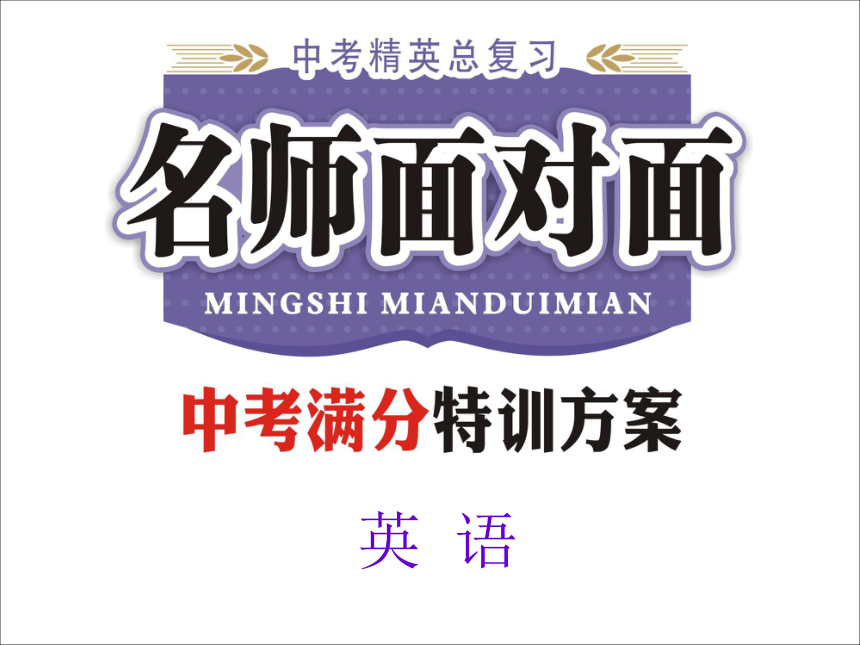 | |
| 格式 | zip | ||
| 文件大小 | 374.6KB | ||
| 资源类型 | 教案 | ||
| 版本资源 | 外研版 | ||
| 科目 | 英语 | ||
| 更新时间 | 2014-12-19 19:58:19 | ||
图片预览


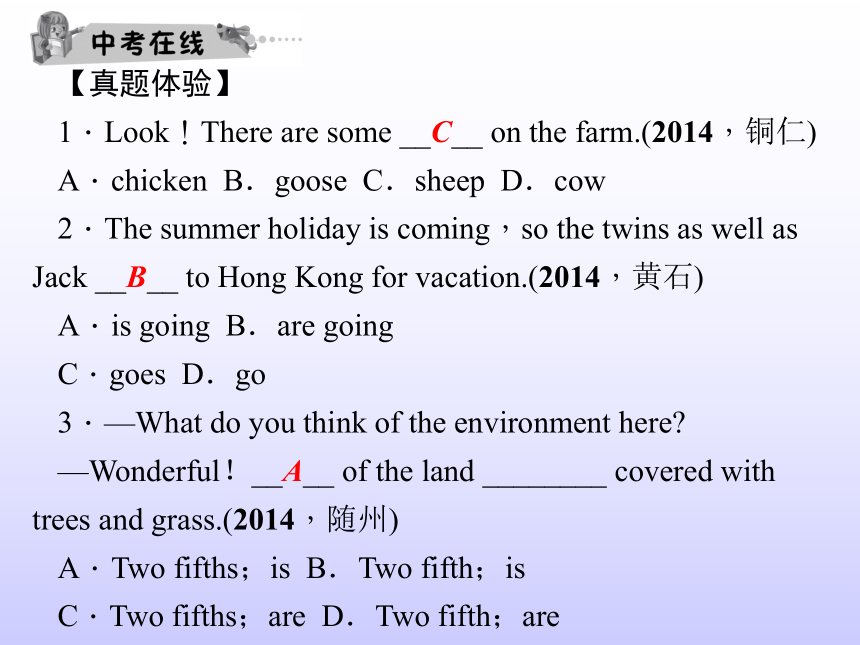
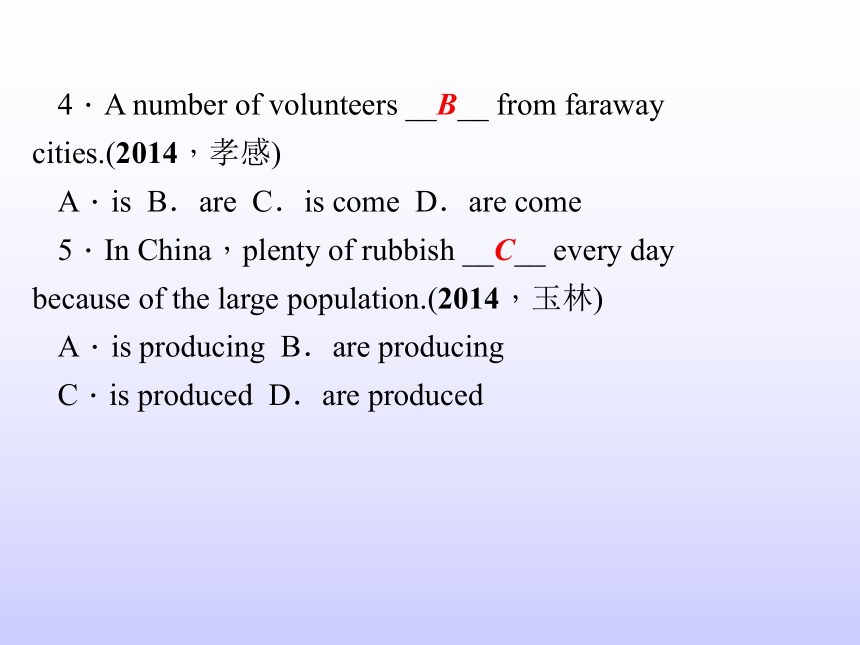
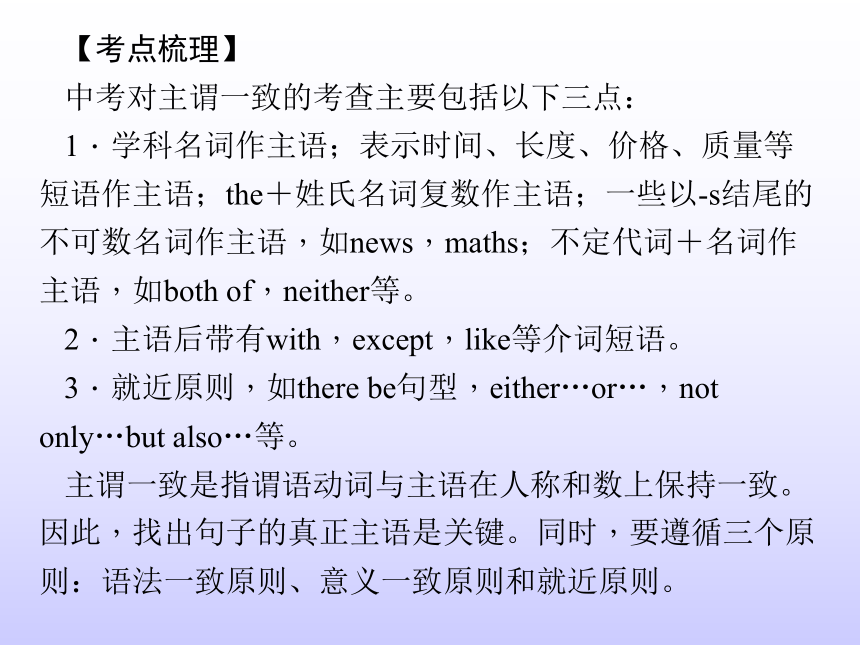
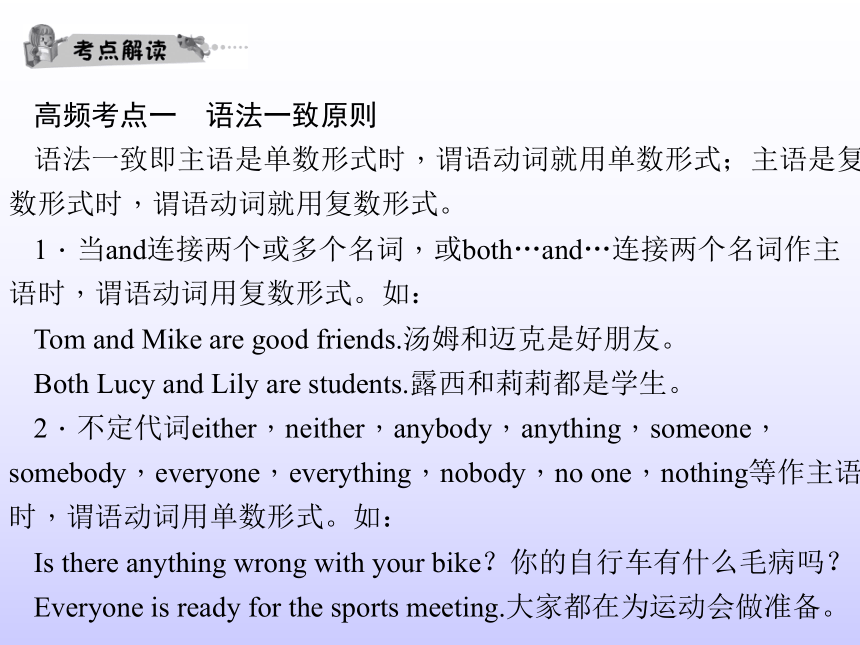
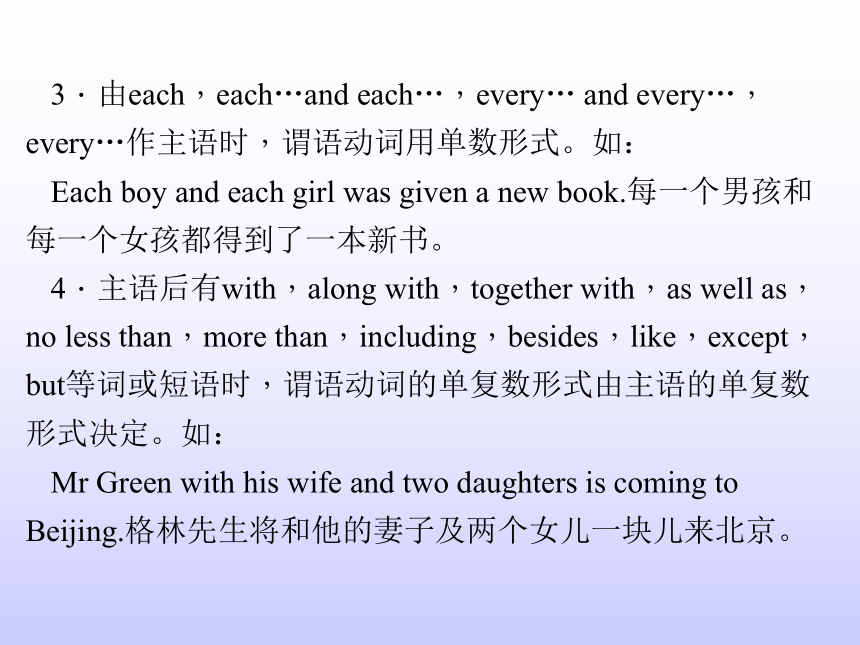
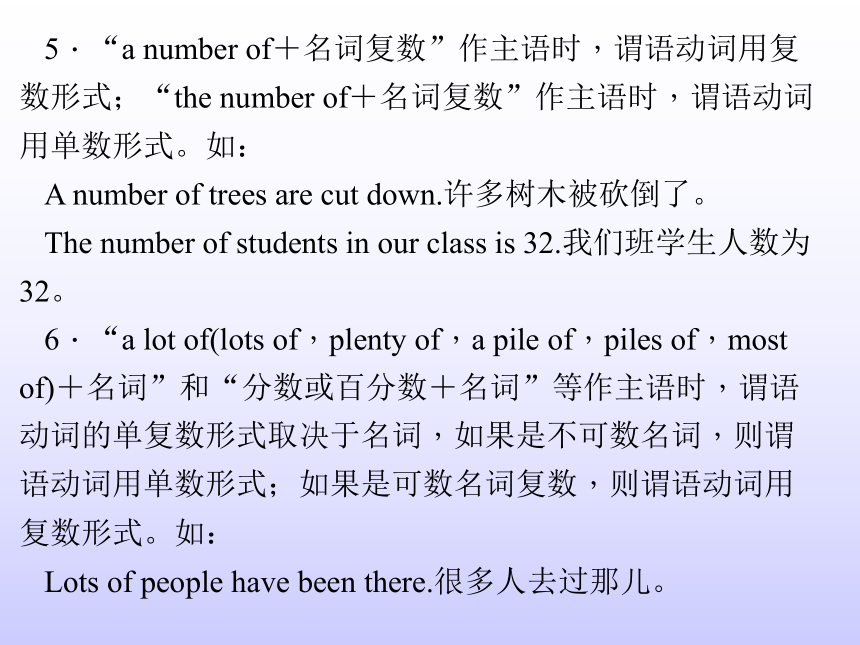
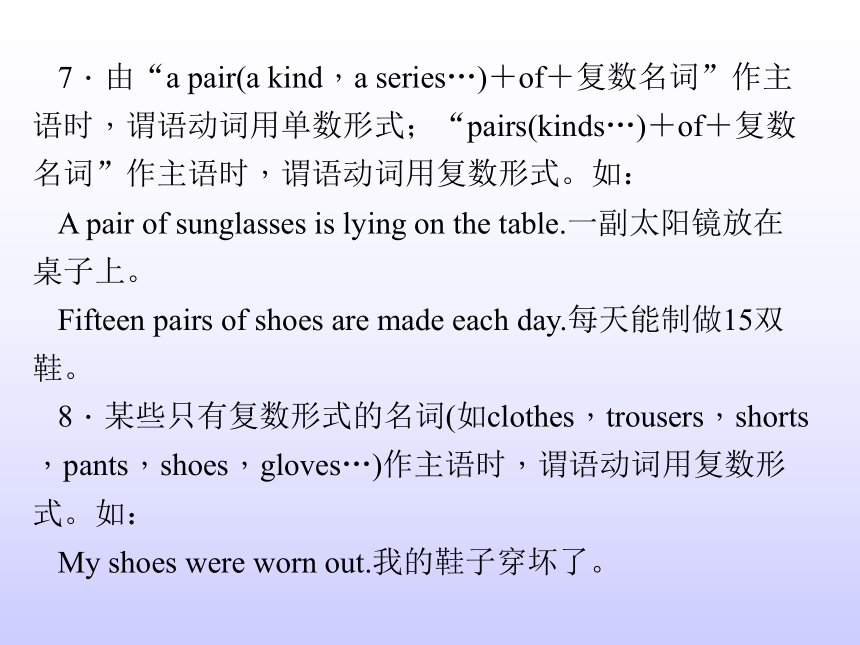
文档简介
课件20张PPT。英 语第37讲 主谓一致【真题体验】
1.Look!There are some __C__ on the farm.(2014,铜仁)
A.chicken B.goose C.sheep D.cow
2.The summer holiday is coming,so the twins as well as Jack __B__ to Hong Kong for vacation.(2014,黄石)
A.is going B.are going
C.goes D.go
3.—What do you think of the environment here?
—Wonderful!__A__ of the land ________ covered with trees and grass.(2014,随州)
A.Two fifths;is B.Two fifth;is
C.Two fifths;are D.Two fifth;are4.A number of volunteers __B__ from faraway cities.(2014,孝感)
A.is B.are C.is come D.are come
5.In China,plenty of rubbish __C__ every day because of the large population.(2014,玉林)
A.is producing B.are producing
C.is produced D.are produced【考点梳理】
中考对主谓一致的考查主要包括以下三点:
1.学科名词作主语;表示时间、长度、价格、质量等短语作主语;the+姓氏名词复数作主语;一些以-s结尾的不可数名词作主语,如news,maths;不定代词+名词作主语,如both of,neither等。
2.主语后带有with,except,like等介词短语。
3.就近原则,如there be句型,either…or…,not only…but also…等。
主谓一致是指谓语动词与主语在人称和数上保持一致。因此,找出句子的真正主语是关键。同时,要遵循三个原则:语法一致原则、意义一致原则和就近原则。高频考点一 语法一致原则
语法一致即主语是单数形式时,谓语动词就用单数形式;主语是复数形式时,谓语动词就用复数形式。
1.当and连接两个或多个名词,或both…and…连接两个名词作主语时,谓语动词用复数形式。如:
Tom and Mike are good friends.汤姆和迈克是好朋友。
Both Lucy and Lily are students.露西和莉莉都是学生。
2.不定代词either,neither,anybody,anything,someone,somebody,everyone,everything,nobody,no one,nothing等作主语时,谓语动词用单数形式。如:
Is there anything wrong with your bike?你的自行车有什么毛病吗?
Everyone is ready for the sports meeting.大家都在为运动会做准备。3.由each,each…and each…,every… and every…,every…作主语时,谓语动词用单数形式。如:
Each boy and each girl was given a new book.每一个男孩和每一个女孩都得到了一本新书。
4.主语后有with,along with,together with,as well as,no less than,more than,including,besides,like,except,but等词或短语时,谓语动词的单复数形式由主语的单复数形式决定。如:
Mr Green with his wife and two daughters is coming to Beijing.格林先生将和他的妻子及两个女儿一块儿来北京。5.“a number of+名词复数”作主语时,谓语动词用复数形式;“the number of+名词复数”作主语时,谓语动词用单数形式。如:
A number of trees are cut down.许多树木被砍倒了。
The number of students in our class is 32.我们班学生人数为32。
6.“a lot of(lots of,plenty of,a pile of,piles of,most of)+名词”和“分数或百分数+名词”等作主语时,谓语动词的单复数形式取决于名词,如果是不可数名词,则谓语动词用单数形式;如果是可数名词复数,则谓语动词用复数形式。如:
Lots of people have been there.很多人去过那儿。7.由“a pair(a kind,a series…)+of+复数名词”作主语时,谓语动词用单数形式;“pairs(kinds…)+of+复数名词”作主语时,谓语动词用复数形式。如:
A pair of sunglasses is lying on the table.一副太阳镜放在桌子上。
Fifteen pairs of shoes are made each day.每天能制做15双鞋。
8.某些只有复数形式的名词(如clothes,trousers,shorts,pants,shoes,gloves…)作主语时,谓语动词用复数形式。如:
My shoes were worn out.我的鞋子穿坏了。9.不定式或动名词作主语时,谓语动词用单数形式。如:Reading is learning.读书就是学习。
【例1】 Oh!Jennifer with her parents __ A __ dinner there.(2014,齐齐哈尔)
A.is having B.are having
C.have D.having
点拨:主语后有with时,谓语动词单复数由主语决定。此句主语为Jennifer,故谓语用单数。
【例2】 Chopsticks _ B _ every day when people eat Chinese food.
A.is used B.are used
C.was used D.were used
点拨:chopsticks作主语,是复数形式;谓语动词应用复数,由句意可知是每天被使用,应用被动语态。高频考点二 意义一致原则
意义一致又叫概念一致,即谓语动词用单数形式还是复数形式要看主语所表达的概念。
1.由and连接的两个名词,如果是指同一概念(即and后面无冠词),则谓语动词用单数形式。如:
The teacher and writer is coming to give us a report next week.那位老师兼作家下周要来给我们作报告。
The singer and dancer has been invited to the party.那位歌唱家兼舞蹈家被邀请参加了聚会。
2.表示金钱、价格、时间、长度等复数名词、词组作主语时,一般被看做一个整体,谓语动词常用单数形式。如:Three years is a long time.三年是一段很长的时间。3.集体名词(如family,team,crowd,company,class,group,government…)如果表示整体概念,则谓语动词用单数形式;如果表示集体中的成员,则谓语动词用复数形式。如:
My family is a small one with three people.我家是一个有三口人的小家庭。
4.people,police,cattle等集合名词作主语时,谓语动词用复数形式。如:
The police are helping a girl find her mother.警察正在帮助一个女孩找妈妈。
5.算式中,表示加法和乘法时谓语动词可用单数形式,也可用复数形式,但表示减法和除法时谓语动词必须用单数形式。如:
What is/are three times three?3乘以3是多少?【例3】 —Do you need more time to complete the task?
—Yes.Another ten days _ A __ enough.(2014,广东)
A.is B.was C.are D.were
点拨:答句主语为another ten days,时间作主语,谓语动词用单数形式。由问句可知应用现在时。
高频考点三 就近原则
有时谓语动词的形式与主语并不一致,而是与靠近它的名词一致,这种原则叫做就近原则,又叫做邻近原则。1.由either…or…,neither…nor…,not only…but(also)…,not…but…或or连接两个并列主语时,谓语动词与较近的主语在人称和数上保持一致。如:
Not only my parents but also I am looking forward to meeting my uncle.不但我父母而且我也盼望看到我叔叔。
Not only Jim but also his parents want to live in China.不仅吉姆而且他的父母也想居住在中国。
He or you have taken my pen.他或你拿了我的钢笔。
2.There be…和Here be…这两个句式中的be动词常与最近的主语在数上保持一致。如:
There is an apple and two bananas on the table.桌子上有一个苹果和两根香蕉。【例4】 There _ C _ a book and some pens in the bag.Please give them to the old man.(2014,毕节)
A.be B.are C.is D.have
点拨:主语为a book and some pens,谓语应和最近的主语保持一致。there be表示“在某地有某物”。
【例5】 Not only you but also he _ A _ the secret.(2014,六盘水)
A.knows B.know
C.have known D.to know
点拨:not only...but also...连接两个主语时,谓语动词单复数与相邻的主语单复数保持一致。【例6】 There _ C _ some flowers on the teacher's desk just now,but now there ________ nothing on it.
A.have;has B.were;has
C.were;is D.has;has
点拨:第一空应根据some flowers来确定谓语动词应用复数,just now表明是过去时;第二空根据nothing来判断谓语动词应用单数。1.—What __A__ the number of the students in your school?(2014,泰安)
—About two thousand.A number of them ________ from the countryside.
A.is;are B.is;is
C.are;is D.are;are
2.—How do you like these two books?(2014,益阳)
—__A__ of them are interesting.And I've read them several times.
A.Both B.Neither C.None D.Either
3.—I called you at 5:00 yesterday afternoon,but no one answered.
—Sorry,I with my parents __A__ at that time.(2014,达州)
A.was shopping B.were shopping
C.are shopping D.went shoppingos4.Look,the set of keys __C__ on the teacher's desk.(2014,安顺)
A.are B.were C.is D.was
5.—A number of people __A__ killed by the terrorists at the Urumqi train station.
—________ terrible it is!(2014,鄂州)
A.were;How B.was;How
C.were;What D.was;What
6.The sick boy,together with his parents,__D__ to the hospital.
A.sends B.send
C.were sent D.was sent7.There _A_ some milk and two eggs on the table.(2014,永州)
A.is B.are C.has D.have
8.Everyone except Tom and John __D__ there when the meeting began.(2013,威海)
A.are B.is C.were D.was
9.Neither Kate nor her cousins __A__ to America,but __ of them have known the country very well.(2013,绥化)
A.have been;all B.have gone;both
C.has been;all D.has gone;both
10.—Maths __A__ my favourite subject,what about you?(2013,广安)
—Physics ________.I think it's very interesting.
A.is;is B.are;are C.are;is D.is;are11.Thanks to the organization,some money __A__ given to the poor children.
A.was B.were C.are D.has
12.No one __B__ swimming in such bad weather.
A.like B.likes C.liking D.liked
13.Diana,together with her friends,__C__ Chinese in China.
A.study B.have studied
C.studies D.are studying
14.—Would you like to go to the concert with me tonight?
—I'd love to,but __C__ of us two has tickets.Do you have some?
A.both B.all C.neither D.none
1.Look!There are some __C__ on the farm.(2014,铜仁)
A.chicken B.goose C.sheep D.cow
2.The summer holiday is coming,so the twins as well as Jack __B__ to Hong Kong for vacation.(2014,黄石)
A.is going B.are going
C.goes D.go
3.—What do you think of the environment here?
—Wonderful!__A__ of the land ________ covered with trees and grass.(2014,随州)
A.Two fifths;is B.Two fifth;is
C.Two fifths;are D.Two fifth;are4.A number of volunteers __B__ from faraway cities.(2014,孝感)
A.is B.are C.is come D.are come
5.In China,plenty of rubbish __C__ every day because of the large population.(2014,玉林)
A.is producing B.are producing
C.is produced D.are produced【考点梳理】
中考对主谓一致的考查主要包括以下三点:
1.学科名词作主语;表示时间、长度、价格、质量等短语作主语;the+姓氏名词复数作主语;一些以-s结尾的不可数名词作主语,如news,maths;不定代词+名词作主语,如both of,neither等。
2.主语后带有with,except,like等介词短语。
3.就近原则,如there be句型,either…or…,not only…but also…等。
主谓一致是指谓语动词与主语在人称和数上保持一致。因此,找出句子的真正主语是关键。同时,要遵循三个原则:语法一致原则、意义一致原则和就近原则。高频考点一 语法一致原则
语法一致即主语是单数形式时,谓语动词就用单数形式;主语是复数形式时,谓语动词就用复数形式。
1.当and连接两个或多个名词,或both…and…连接两个名词作主语时,谓语动词用复数形式。如:
Tom and Mike are good friends.汤姆和迈克是好朋友。
Both Lucy and Lily are students.露西和莉莉都是学生。
2.不定代词either,neither,anybody,anything,someone,somebody,everyone,everything,nobody,no one,nothing等作主语时,谓语动词用单数形式。如:
Is there anything wrong with your bike?你的自行车有什么毛病吗?
Everyone is ready for the sports meeting.大家都在为运动会做准备。3.由each,each…and each…,every… and every…,every…作主语时,谓语动词用单数形式。如:
Each boy and each girl was given a new book.每一个男孩和每一个女孩都得到了一本新书。
4.主语后有with,along with,together with,as well as,no less than,more than,including,besides,like,except,but等词或短语时,谓语动词的单复数形式由主语的单复数形式决定。如:
Mr Green with his wife and two daughters is coming to Beijing.格林先生将和他的妻子及两个女儿一块儿来北京。5.“a number of+名词复数”作主语时,谓语动词用复数形式;“the number of+名词复数”作主语时,谓语动词用单数形式。如:
A number of trees are cut down.许多树木被砍倒了。
The number of students in our class is 32.我们班学生人数为32。
6.“a lot of(lots of,plenty of,a pile of,piles of,most of)+名词”和“分数或百分数+名词”等作主语时,谓语动词的单复数形式取决于名词,如果是不可数名词,则谓语动词用单数形式;如果是可数名词复数,则谓语动词用复数形式。如:
Lots of people have been there.很多人去过那儿。7.由“a pair(a kind,a series…)+of+复数名词”作主语时,谓语动词用单数形式;“pairs(kinds…)+of+复数名词”作主语时,谓语动词用复数形式。如:
A pair of sunglasses is lying on the table.一副太阳镜放在桌子上。
Fifteen pairs of shoes are made each day.每天能制做15双鞋。
8.某些只有复数形式的名词(如clothes,trousers,shorts,pants,shoes,gloves…)作主语时,谓语动词用复数形式。如:
My shoes were worn out.我的鞋子穿坏了。9.不定式或动名词作主语时,谓语动词用单数形式。如:Reading is learning.读书就是学习。
【例1】 Oh!Jennifer with her parents __ A __ dinner there.(2014,齐齐哈尔)
A.is having B.are having
C.have D.having
点拨:主语后有with时,谓语动词单复数由主语决定。此句主语为Jennifer,故谓语用单数。
【例2】 Chopsticks _ B _ every day when people eat Chinese food.
A.is used B.are used
C.was used D.were used
点拨:chopsticks作主语,是复数形式;谓语动词应用复数,由句意可知是每天被使用,应用被动语态。高频考点二 意义一致原则
意义一致又叫概念一致,即谓语动词用单数形式还是复数形式要看主语所表达的概念。
1.由and连接的两个名词,如果是指同一概念(即and后面无冠词),则谓语动词用单数形式。如:
The teacher and writer is coming to give us a report next week.那位老师兼作家下周要来给我们作报告。
The singer and dancer has been invited to the party.那位歌唱家兼舞蹈家被邀请参加了聚会。
2.表示金钱、价格、时间、长度等复数名词、词组作主语时,一般被看做一个整体,谓语动词常用单数形式。如:Three years is a long time.三年是一段很长的时间。3.集体名词(如family,team,crowd,company,class,group,government…)如果表示整体概念,则谓语动词用单数形式;如果表示集体中的成员,则谓语动词用复数形式。如:
My family is a small one with three people.我家是一个有三口人的小家庭。
4.people,police,cattle等集合名词作主语时,谓语动词用复数形式。如:
The police are helping a girl find her mother.警察正在帮助一个女孩找妈妈。
5.算式中,表示加法和乘法时谓语动词可用单数形式,也可用复数形式,但表示减法和除法时谓语动词必须用单数形式。如:
What is/are three times three?3乘以3是多少?【例3】 —Do you need more time to complete the task?
—Yes.Another ten days _ A __ enough.(2014,广东)
A.is B.was C.are D.were
点拨:答句主语为another ten days,时间作主语,谓语动词用单数形式。由问句可知应用现在时。
高频考点三 就近原则
有时谓语动词的形式与主语并不一致,而是与靠近它的名词一致,这种原则叫做就近原则,又叫做邻近原则。1.由either…or…,neither…nor…,not only…but(also)…,not…but…或or连接两个并列主语时,谓语动词与较近的主语在人称和数上保持一致。如:
Not only my parents but also I am looking forward to meeting my uncle.不但我父母而且我也盼望看到我叔叔。
Not only Jim but also his parents want to live in China.不仅吉姆而且他的父母也想居住在中国。
He or you have taken my pen.他或你拿了我的钢笔。
2.There be…和Here be…这两个句式中的be动词常与最近的主语在数上保持一致。如:
There is an apple and two bananas on the table.桌子上有一个苹果和两根香蕉。【例4】 There _ C _ a book and some pens in the bag.Please give them to the old man.(2014,毕节)
A.be B.are C.is D.have
点拨:主语为a book and some pens,谓语应和最近的主语保持一致。there be表示“在某地有某物”。
【例5】 Not only you but also he _ A _ the secret.(2014,六盘水)
A.knows B.know
C.have known D.to know
点拨:not only...but also...连接两个主语时,谓语动词单复数与相邻的主语单复数保持一致。【例6】 There _ C _ some flowers on the teacher's desk just now,but now there ________ nothing on it.
A.have;has B.were;has
C.were;is D.has;has
点拨:第一空应根据some flowers来确定谓语动词应用复数,just now表明是过去时;第二空根据nothing来判断谓语动词应用单数。1.—What __A__ the number of the students in your school?(2014,泰安)
—About two thousand.A number of them ________ from the countryside.
A.is;are B.is;is
C.are;is D.are;are
2.—How do you like these two books?(2014,益阳)
—__A__ of them are interesting.And I've read them several times.
A.Both B.Neither C.None D.Either
3.—I called you at 5:00 yesterday afternoon,but no one answered.
—Sorry,I with my parents __A__ at that time.(2014,达州)
A.was shopping B.were shopping
C.are shopping D.went shoppingos4.Look,the set of keys __C__ on the teacher's desk.(2014,安顺)
A.are B.were C.is D.was
5.—A number of people __A__ killed by the terrorists at the Urumqi train station.
—________ terrible it is!(2014,鄂州)
A.were;How B.was;How
C.were;What D.was;What
6.The sick boy,together with his parents,__D__ to the hospital.
A.sends B.send
C.were sent D.was sent7.There _A_ some milk and two eggs on the table.(2014,永州)
A.is B.are C.has D.have
8.Everyone except Tom and John __D__ there when the meeting began.(2013,威海)
A.are B.is C.were D.was
9.Neither Kate nor her cousins __A__ to America,but __ of them have known the country very well.(2013,绥化)
A.have been;all B.have gone;both
C.has been;all D.has gone;both
10.—Maths __A__ my favourite subject,what about you?(2013,广安)
—Physics ________.I think it's very interesting.
A.is;is B.are;are C.are;is D.is;are11.Thanks to the organization,some money __A__ given to the poor children.
A.was B.were C.are D.has
12.No one __B__ swimming in such bad weather.
A.like B.likes C.liking D.liked
13.Diana,together with her friends,__C__ Chinese in China.
A.study B.have studied
C.studies D.are studying
14.—Would you like to go to the concert with me tonight?
—I'd love to,but __C__ of us two has tickets.Do you have some?
A.both B.all C.neither D.none
同课章节目录
- 词法
- 名词
- 动词和动词短语
- 动词语态
- 动词时态
- 助动词和情态动词
- 非谓语动词
- 冠词
- 代词
- 数词和量词
- 形容词副词及其比较等级
- 介词和介词短语
- 连词和感叹词
- 构词法
- 相似、相近词比较
- 句法
- 陈述句
- 一般疑问句和否定疑问句
- 特殊疑问句及选择疑问句
- 反意疑问句
- 存在句(There be句型)
- 宾语从句
- 定语从句
- 状语从句
- 主谓一致问题
- 简单句
- 并列句
- 复合句
- 主谓一致
- 主、表语从句
- 名词性从句
- 直接引语和间接引语
- 虚拟语气
- 感叹句
- 强调句
- 倒装句
- 祈使句
- 句子的成分
- 句子的分类
- 题型专区
- 单项选择部分
- 易错题
- 完形填空
- 阅读理解
- 词汇练习
- 听说训练
- 句型转换
- 补全对话
- 短文改错
- 翻译
- 书面表达
- 任务型阅读
- 语法填空
- 其他资料
